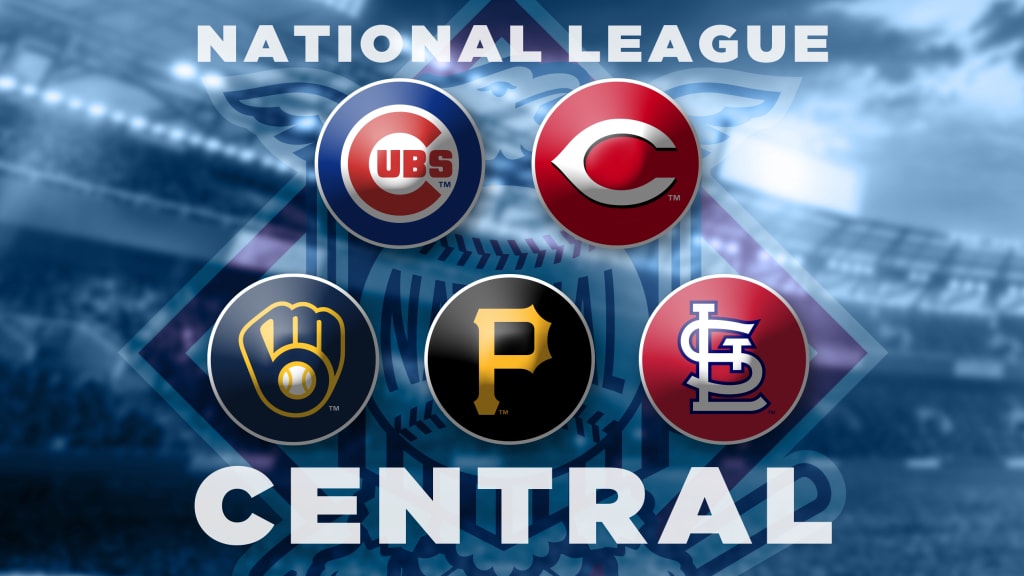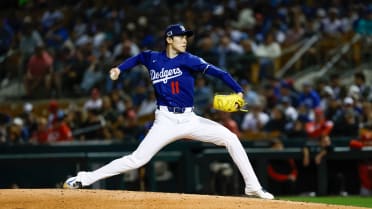These NL Central players feel need for speed

When Draft time comes around, guys with elite speed tend to get first-round looks -- for good reason.
Speed is one of the most prominent two-way skills in baseball; it both impacts a player’s ability to reach base and his ability to track down batted balls and field them cleanly. Even if a player with wheels struggles to hit, he still adds tremendous value on the bench as a pinch-runner or defensive replacement.
But in the National League Central, the speediest guys tend to get regular reps, and some combine speed with tremendous batting and fielding capabilities to garner NL MVP Award consideration.
Here’s a look at the fastest players on each team in the division:
Brewers: Christian Yelich
Statcast metrics provide a guide -- sprint speed, Bolts and home-to-first-base time -- and Yelich is the clear frontrunner (pun intended) in all of them thanks to the departure of Trent Grisham (traded to San Diego) and Cory Spangenberg (signed in Japan). Yelich’s average sprint speed was 28.7 feet per second (trailing only Grisham and Spangenberg among 2019 Brewers). He tallied a team-leading 18 Bolts -- the number of runs where the sprint speed of the runner is at least 30 ft/sec -- and his home-to-first time on "topped" or "weakly hit" balls was 4.16 seconds, trailing only Spangenberg. Factors that could threaten Yelich’s speed supremacy would be some setback with the right kneecap he fractured on a foul ball last September, though the Brewers don’t anticipate any problems, or the return of speedy Keon Broxton in a potential '20 season. Broxton, who signed a Minor League contract last winter, recorded a 29.3 sprint speed last year, and Yelich had Broxton beat by just .02 seconds on home-to-first. -- Adam McCalvy
Cardinals: Harrison Bader
The candidates include Tyler O'Neill, Lane Thomas, Tommy Edman and Kolten Wong as well; the Cardinals have a core group of speedy players that have helped with the team’s elite baserunning. Bader’s 29.8 ft/sec average sprint speed for his career is top tier in the big leagues, and in 2019, he averaged 29.5 ft/sec. He had a team-high 47 Bolts, and that number ranked 11th among Major League players last season. In '18, Bader had 69 Bolts and registered an average sprint speed of 30 ft/sec. His defense in center field is top ranked, in part because of the speed he has out there. The 25-year-old had a down year at the plate, but if he can get on base more, there’s little doubt he can be one of the top baserunners in the league. -- Anne Rogers
Cubs: Javier Báez
When Báez reaches base, it's best not to take your eyes off him. While the Cubs' dynamic shortstop isn't really known for piling up stolen bases, he is famous for his creativity on the bases. He will toy with defenders, run at unpredictable moments and then sometimes finish off a sprint with an acrobatic slide. There is also data to support the idea that Báez is the fastest Cub right now, too. Last season, his sprint speed of 28.6 ft/sec led Cubs regulars, as did his mark of 28.8 in '18, per Statcast. Báez registered 12 of Chicago's 20 fastest Sprint Speeds in '19, topping the elite 30.0 ft/sec threshold five times. The shortstop also led Cubs regulars in '19 with a 40 run-scoring percentage (rate of runs scored when reaching base), a 72 extra-bases-taken percentage and the number of runs scored from second on a single (15).
-- Jordan Bastian
Pirates: Jarrod Dyson
For many years, the Pirates’ answer was Starling Marte. They only had two players steal more than five bases last year: Marte and shortstop Kevin Newman. Infielder Cole Tucker also has wheels with nearly elite-level sprint speed, according to Statcast, and Bryan Reynolds believes he’s fast enough to steal more bases than he did as a rookie. But with Marte on the D-backs' roster, his likely successor as the Pirates’ fastest man is their new center fielder: Dyson.
Dyson will turn 36 in August, so he’s probably not running quite like he did during his Royals-era peak -- back when he made “That’s what speed do” a mission statement. But according to Statcast, his sprint speed of 29 ft/sec was in the 92nd percentile in 2018 and his 28.4 mark was in the 83rd percentile last year. Even with that slight drop-off, he managed to steal 30 bases while being caught only four times for the D-backs in ‘19. Despite limited playing time, he averaged 31 steals per season from '12-17. His speed translates to success in the outfield, too, as his Jump in the outfield ranked in the Majors’ 92nd percentile last year, according to Statcast. -- Adam Berry
Reds: Nick Senzel
Although pitcher/outfielder Michael Lorenzen has shown tremendous speed on the bases and in the outfield to make him a two-way threat, Senzel edges him in sprint speed. According to Statcast, Senzel had a sprint speed of 29.4 ft/sec during his rookie year, just ahead of Lorenzen’s 28.7. From home to first base, Senzel averages at 4.19 seconds and edges out Lorenzen’s 4.25 seconds. Senzel, who shared the team lead in steals with 14 last season, benefits from a larger sample size than Lorenzen, but also showed his tool in the outfield for the first time in his playing career after he switched from the infield after the ’18 season. -- Mark Sheldon
Jake Crouse is a reporter for MLB.com.




